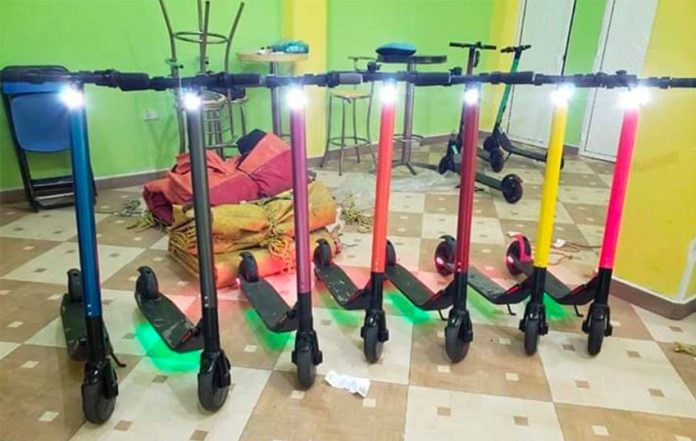Ads selling electric scooters stolen in Mexico City have appeared on social media but one scooter rental company warns potential buyers to not waste their money because they won’t work very long.
Scooters owned by Grin, which has been forced to temporarily suspend its rental service due to theft, are being sold on Facebook and other social networks for between 3,000 and 3,500 pesos (US $155 to $180), according to a report published on the technology news website Xataka.
About 350 of Grin’s scooters — 20% of its stock — have been stolen since the Mexican company started operating in the capital 15 months ago. A large number of the thefts occurred in recent weeks.
Describing theft as the greatest challenge to its operations, Grin announced on Tuesday that it had decided to immediately “pause” its services.
Xataka said it contacted three people who were selling Grin scooters on Facebook, including one person who appeared to have at least six of the stolen vehicles.
All have been painted colors other than green to prevent their easy identification as the property of Grin.
One vendor in the eastern borough of Iztapalapa told Xataka that the scooters he was selling come with a guarantee and work without any problems.
Another vendor in Coyoacán said he sold scooters stolen from both Grin and Lime and assured Xataka that their global positioning systems had been removed so they couldn’t be tracked.
He too said they work without any problems, explaining that they had been unblocked and would remain that way.
However, Grin’s communications director told the newspaper El Financiero that buying a stolen scooter was akin to throwing money down the drain.
“. . . You won’t get any guarantee it will work. A specific charger is needed that can’t be [easily] obtained. There’s no guarantee that the scooter will work for more than three or four rides,” Beriana Mendoza said.
“Don’t make the decision to buy one of these scooters because you’ll be throwing your money away,” she warned.
Despite the claim about the difficulty in obtaining chargers, the Coyoacán-based vendor said he supplies original versions with all the scooters he sells.
Mendoza said Grin has located a lot of its stolen scooters via GPS but explained that most won’t be retrieved because they are in dangerous parts of Mexico City and the company refuses to place their employees in risky situations.
Instead Grin is collaborating with local authorities to develop schemes that prevent theft, she said, adding that the company’s scooters are expected to be back on the streets in two to three weeks.
Before their withdrawal, Grin was the only e-scooter company operating in Mexico City with a license.
Grin paid the capital’s Transportation Secretariat 14,000 pesos for each of the 1,750 scooters it placed in certain neighborhoods, meaning that its total outlay for operational permission was 24.5 million pesos (US $1.3 million).
But instead of recouping its costs and building on its profits, it is thieves who are currently benefiting from the company’s decision to enter the Mexico City micro-mobility market.
Source: El Financiero (sp), Xataka (sp)
